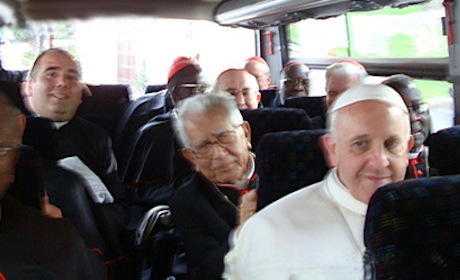That’s the headline accompanying this piece by veteran Vatican-watcher Sandro Magister, who offers his take on the early days of the Franciscan pontificate, and why there is a “benevolence of secular public opinion” toward him:
One key element of Francis’s popularity is his personal credibility. As archbishop of Buenos Aires, he lived in a modest two-room apartment. He cooked for himself. He got around by bus and metro. He fled from worldly engagements as from the plague. He never wanted to make a career for himself, but on the contrary patiently stepped aside when his own Society of Jesus, of which he had been provincial superior in Argentina for several years, brusquely deposed and isolated him.
For this reason as well, every time he invokes poverty for the Church and rails against the ambitions of power and greed for wealth present in the ecclesiastical camp, no voice is raised to criticize him. Who could ever justify the oppression of the destitute, and come to the defense of unmerited careers? Who could ever charge Francis with failing to practice what he preaches? On the lips of the current pope, the paradigm of a poor Church is an infallible one. It garners a practically universal consensus, both among the friends and among the most ardent enemies of the Church, those who would like to see it so impoverished as to disappear altogether…
…Pope Francis’s way of speaking is certainly one of his most original traits. It is simple, understandable, communicative. It has the appearance of improvisation, but in reality is carefully studied, as much in the invention of formulas – the “soap bubble” that he used in Lampedusa to represent the egoism of the modern Herods – as in the fundamentals of the Christian faith that he loves most to repeat and are crystallized in a consoling “all is grace,” the grace of God who incessantly forgives although all continue to be sinners.
But in addition to the things that he says are those about which he is deliberately silent. It cannot be an accident that after 120 days of pontificate Pope Francis has not yet spoken the words abortion, euthanasia, homosexual marriage.
Pope Bergoglio succeeded in dodging them even on the day that he dedicated to “Evangelium Vitae,” the tremendous encyclical published by John Paul II in 1995 at the culmination of his epic battle in defense of life “from conception to natural death.”
Karol Wojtyla and Benedict XVI after him exerted themselves incessantly and in person to combat the epochal challenge represented by the modern ideology of birth and death, as also by the dissolution of the creatural duality between male and female. Not Bergoglio. It seems well-established by now that he has decided to remain silent on these issues that touch upon the political sphere of the entire West, including Latin America, convinced that such statements are not the responsibility of the pope but of the bishops of each nation. He told the Italians in unmistakable words: “The dialogue with political institutions is your affair.”
The risk of this division of labor is high for Francis himself, given the hardly flattering judgment that he has repeatedly demonstrated he has on the average quality of the bishops of the world. But it is a risk that he wants to take. This silence of his is another of the factors that explain the benevolence of secular public opinion in his regard.
















